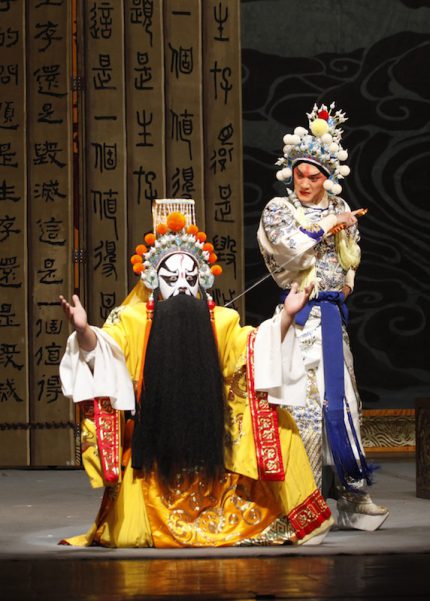Shanghai opera company serves up a colorful, exhilarating “Hamlet”

There’s something exhilarating about immersing yourself for a few hours in the highly complex art of a foreign culture, as a happy audience discovered Wednesday at the first of two performances by the Shanghai Jingju Theatre Company at the Harris Theater. A leading troupe in the centuries-old tradition of Peking Opera, Jingju presented its take on Shakespeare’s Hamlet in a two-hour amalgam of spoken word, song, acrobatics and music titled The Revenge of Prince Zi Dan.
Peking opera, a performance style rather than a specific company based in the city now known as Beijing, is extremely codified. Familiar with the style, Chinese audiences immediately understand that certain gestures convey a particular situation, that props and costume colors reveal exactly who a character is. When they hear a traditional melodic phrase they know what emotion is being revealed. Notes in the Harris’s program valiantly offered a basic primer outlining such artistic details.
But what newcomer can absorb all that information in a few minutes before the curtain goes up? So Wednesday’s audience, mainly non-Chinese, did what any experienced theater-goers would do. They tossed aside the program notes and opened their ears, eyes and hearts to this beautifully crafted, emotionally engaging theater.
The familiar story, recreated by writer Feng Gang and director Shi Yukun expressly to make Peking opera accessible to Western audiences, eased that plunge into the unknown. As Zi Dan, the Hamlet figure, actor Fu Xiru fully embodied both the hot-headed passion and crafty quest for revenge of Shakespeare’s Danish prince. Lithe and handsome, with a crisp speaking voice and rich-toned singing, he strode the stage with youthful swagger, wearing elaborate brocade robes and high-platform slippers. In moments of anger, he reared back on one leg, raising the other like a weapon. Sidling across the stage, his standing foot inching along the floor like a twitchy ice cube, he became almost inhuman, a jagged figure of unbridled violence.
Seated in an alcove at the side of the stage, the company’s small band added distinctive musical colors–the powerful thud of a drum, the metallic shimmer of cymbals and strummed strings, the whine of a two-stringed violin and the occasional solace of a mellow flute. Their accompaniment was episodic, and the players were silent during some spoken passages. But throughout the evening, they shifted easily between jaunty, folk-tinged tunes and tense, driven moments of atmospheric sound.
Vocally, Peking opera’s speech and music are austere and stylized. The women spoke in exaggeratedly high, tight, yet melodious voices, and that tight quality informed their singing as well. But they sailed expertly through melodies that can sound piercing and exotic to Western ears. Their daring leaps and plunges, and especially their extended ornaments on single syllables, were thrilling.
As Ying Li, the Ophelia character, Zhao Huan was especially vivid. Her amplification turned glitchy in her first confrontation with Hamlet, but later in the play she was softly vulnerable as the mad Ophelia, passing out her carefully gathered flowers to the horrified onlookers. Her simple robe in that scene, transparent white with a wide blue border, fluttered gently as she moved.
In general, the troupe’s makeup and costumes were sumptuous, with the women in sparkling, elaborate headdresses and the men in massive robes and, occasionally, sleek, shining beards falling past their waists. In the opening scene, as Hamlet encountered his father’s ghost, Fu Xiru’s headdress included two extremely long, slender feathers that arched high above his head, as noble and elegant as the curving horns of a big-horned sheep. Flexible and expressive, they dropped over Zi Dan’s bowed figure like weeping willows as he absorbed the news of his father’s murder.
The play’s final scene included a spectacularly athletic jousting scene, and among the strong cast, Zhu Heji was the standout, as a comic, acrobatic, Polonius character. Sitting on his haunches like a baseball catcher, his body encased in a stiff robe that concealed his bent legs, he skittered around the stage dispensing advice like a meddlesome R2D2. Muscular but compact, he hurled himself about like a buoyant ball, turning Polonius’s death throes into a jaw-dropping series of bouncing somersaults and rolling falls.
Cheering as the final curtain fell, Wednesday’s audience may not have known much about Peking Opera’s stylistic intricacies. But they knew enough to appreciate that Jingju’s Hamlet had provided a memorable night at the opera.
Shanghai Jingju Theater Company will repeat The Revenge of Prince Zi Dan 7:30 p.m. Thursday at the Harris Theater. harristheaterchicago.org
Posted in Uncategorized





Posted Sep 30, 2016 at 12:28 pm by Susan Taylor
Shanghai Jingju’s “Hamlet” was an astonishing feast for the eyes and ears. I was very lucky to be in the audience Thursday night.